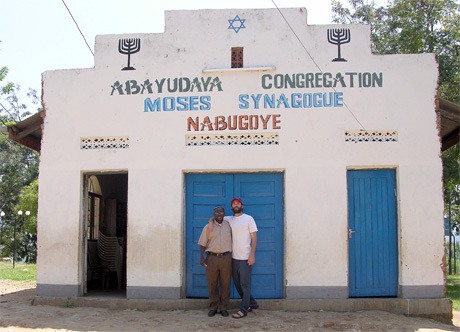When Gabriel Bass arrived in Mbale, Uganda, he brought a little bit of Israel with him.
It was in the form of a lamp — or ner tamid, ‘eternal light’ — and a menorah, which took two months to complete for an African Jewish synagogue, Abayudaya Moses, just outside Mbale in Nabugoye Hill.
Bass fashioned the pieces at his Custom Carving workshop in the foothills of Jerusalem, where he relocated from Mercer Island five years ago.
“Both pieces were a combination between wood and glass, both made from one piece of wood — a cypress log that I had found a number of years ago in the Jerusalem forest between my house and Jerusalem,” said Bass, who spoke with the Reporter from Bar Giyorra, Israel, where he returned from Mbale in mid-August. “I had been saving and drying it in the studio for a number of years. This job came around, and it was the right time to cut [the log] up. It was really special for them to get a piece made from wood in Israel, which is also very rare.”
The Abayudaya Moses Synagogue is located in a community without electricity or running water — a farming community of dirt roads and homes built out of mud and sticks.
“Everyone was really excited and quite amazed that I would go out there and install the work myself. The people were so friendly and so welcoming, really unbelievably so; people rushed up to me to help me out. The day I got there, they wanted to start unpacking the work and seeing it, and it wasn’t put together, really; I brought it in pieces and had to put it together on the spot,” he said, despite not being able to obtain an electric drill in Mbale.
The cypress wood of the solar-powered ner tamid was seasoned for three years before Bass lathed and carved it into a hollow mould, where glass — in the red, black and yellow of the Ugandan flag — was blown to hold the shape and opened on the opposite end.
Creating Judaic art and furniture for synagogues and homes has been Bass’ passion for more than 12 years.
He uses a variety of woods: African walnut, yellow cedar, olive, cherry.
It started with a totem pole carving apprenticeship on an Indian reservation in British Columbia. Bass graduated from Mercer Island High School in 1995, went to Hampshire College in Massachusetts and participated in a year abroad program on the Musqueam Indian Reserve in Vancouver.
“After spending a few months with [the Musqueam Indians], being completely fascinated by their stories and the way the stories and art connected, they put a knife in my hand, literally, and said, ‘Why don’t you sit down and carve with us?’ It connected,” he explained.
Not only did the apprenticeship inspire him to pursue the plastic arts, but it gave him a deeper yearning for Jewish community and culture, and “finding out how Jewish ceremonial arts continue the longevity of Judaism, just in the same way that Native American arts continue the Native American culture,” he said.
He then set up an art studio, Custom Carving, above his apartment on Mercer Island, taught carving classes, and studied glass forms at the Pratt Art Center in Seattle. He began exhibiting his works — some of which garnered awards — at venues ranging from the Bellevue Arts Museum Artsfair to the Portland Arts Festival, and museums nationwide such as the B’nai B’rith Klutznick National Jewish Museum in Washington, D.C.
But on Mercer Island, something was missing. It was that tight-knit Jewish community where everyone shares meals and “pops over” to neighbors’ houses, and where “the secular world stops for the Jewish calendar,” Bass said. So, he and his wife, Gabriella, decided to relocate to Israel.
“There’s nothing more challenging than moving away from Mercer Island … of all the places in the world to have to move from,” he said.
But now, living with his wife and two children, ages 2 and 4, in a house just a mile and a half from his workshop outside of Jerusalem, Bass has found his perfect niche.
Currently, he has 10 projects underway — and just one partner in glassblowing, as he does all carving and carpentry himself.
“It’s been a really interesting journey between moving to Israel and starting to connect with my work, kind of through Israel itself,” Bass said. “I believe that the artwork that we do — it is an evolution of what we’re around, of the culture we’re around, of the feeling, of the landscape … and to work here in Israel, I’m learning constantly how the influence simply of being here and being involved in the culture has had such an amazing, positive influence on my work in this vein.”
For more information, go to www.customcarving.org.



